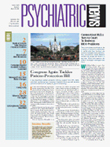Several of the top 10 medical schools in terms of the amount of research funding they get from the National Institutes of Health have been joined by other institutions to draft a set of guidelines meant to clarify, strengthen, and add to research institutions’ policies for dealing with potential financial conflicts of interest that may arise when faculty collaborate with industry.
The group of medical school representatives, convened by Joseph B. Martin, M.D., dean of Harvard Medical School, met in Washington, D.C., in November and finalized draft guidelines last month.
The new guidelines were then submitted to the Association of American Medical Colleges (AAMC), which has formed a committee to review financial conflict-of-interest policies at medical schools and teaching hospitals across the U.S.
“While academic-industry collaborations are essential,” Martin said at a press conference announcing the new guidelines, “if patients are to benefit from the current biomedical revolution, the integrity of those relationships must be monitored by policies that are clearer and more stringent than is the norm today.”
The group’s recommendations are designed to address inconsistencies in these policies at the various institutions. These inconsistencies were discussed in four articles published in the Journal of the American Medical Association and New England Journal of Medicine last fall.
The reports found that of the country’s top 10 research-oriented medical schools, Harvard was the only one that prohibits faculty and researchers from holding any equity interest in companies that could be affected by the research these investigators may pursue.
The other medical schools in this prestigious group were Baylor College of Medicine, both the Los Angeles and San Francisco campuses of the University of California, Columbia University, Johns Hopkins University, the University of Pennsylvania, the University of Washington, Washington University, and Yale University.
The proposed new guidelines are meant to help individual institutions review their own conflict-of-interest policies and would not come with a mandate from the AAMC that the guidelines must be adopted by its member schools. In particular, the guidelines recommend that institutions consider including the following in their conflict-of-interest policies for researchers:
• Require researchers to disclose financial interests to institutional review boards (IRBs) that approve clinical trials.
• Require researchers to disclose financial interests to all persons involved in research trials, including faculty, students, and staff.
• Limit allowable amounts of financial interests researchers may have to a “clearly defined minimal personal financial interest in any company that sponsors research or owns technology being studied.”
• Have researchers seek clarification of types of allowable indirect financial interests, such as trusts and mutual funds.
• Define clearly the financial interests that researchers should disclose, including honoraria, fees, gifts, equity positions such as stocks or stock options, and payments for consulting, directorships, and executive roles.
• Require authors to disclose relevant financial interests to journals considering publication of data and conclusions from clinical trials as well as related research.
“The consensus document developed under the leadership of Dean Martin,” said AAMC President Jordan J. Cohen, M.D., “is a thoughtful addition to the ongoing dialogue regarding conflict-of-interest policies in medical research.” Cohen told those attending the press conference that the group’s proposals will be an excellent starting point for the AAMC task force, which will be chaired by William Danforth, M.D., chancellor emeritus of Washington University. ▪
